
















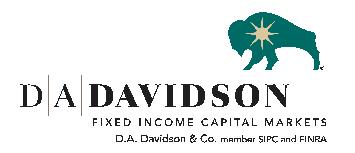








Our Partnerships are Essential to Building a Great City. Thank You Pinnacle Members for Leading the Way!




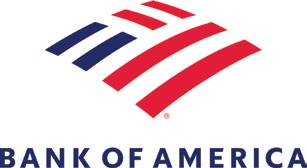






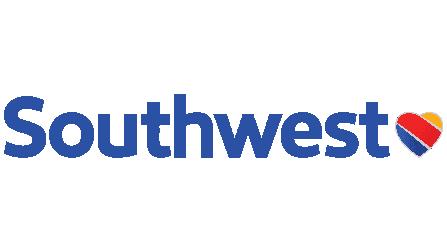








Downtowns across America have undergone generational changes in the last five years. Every urban center is evolving as we grapple with systemic vulnerabilities. Amid these challenges, Downtown Denver is experiencing a historic renaissance driven by bold initiatives that require our entire business community and city to rally around.
We’ve been in this position as a downtown before and we’ve gotten it right by addressing our challenges head-on as a community. The collaborative partnerships we’ve built over years and decades have delivered exceptional results across our center city.
As we present this year’s State of Downtown Denver report, we outline the many ways downtown has evolved to the changing market conditions and create solutions that meet the needs of our city.
We remain focused on creating a mixed-use district with essential amenities that serve both visitors and everyday users. In 2024, Downtown Denver attracted over $1.2 billion in investment, delivering 700,000 square feet of office space, more than 2,000 residential units, and 265 hotel rooms.
Yet, these and other successes, including opening 50 new ground floor businesses last year, are fragile. Lagging return to office, safety concerns and business policy and regulatory challenges are impeding our growth and showing signs of leading to net loss across a number of sectors. As we face these challenges, now is the time to rally around the many opportunities ahead. When communities flourish and business thrive, our center city’s foundation becomes stronger. Every success story strengthens the urban fabric of Downtown Denver.
16th Street, our iconic downtown spine, will fully reopen in 2025, following several successful block openings in 2024. This reimagined public space represents our commitment to creating welcoming environments for commerce, culture, and community.
As Denver continues to emerge as a sports city and the 7th most popular tourist destination in the nation, we’re strategically positioning our downtown to capture this energy and translate it into lasting economic impact.
We also recognize that while crime statistics continue to decrease, safety — and addressing the perception of safety — remains our top priority. Our comprehensive safety strategy is delivering results, but we know there’s more work to be done to ensure everyone feels secure in our downtown spaces.
Despite seeing increased activity in 2024, we’re still operating at approximately 80% of our 2019 pedestrian traffic levels, translating to 53,000 fewer people daily on our downtown streets. As we work to activate downtown, attracting people to our urban core remains both a challenge and opportunity.
The Denver Downtown Development Authority, the Downtown Area Plan update, and the reopening of 16th Street represent three transformative and unprecedented opportunities that will positively change the trajectory of our center city. None of these initiatives would be possible without the collaborative spirit that defines our community. By working together, we can ensure that Downtown Denver remains a place where businesses thrive, residents find community, and visitors experience the best our city has to offer.
Thank you for taking the time to read this report. More importantly, thank you for your continued investment in Downtown Denver. The challenges we face are real, but our shared commitment to this place we love is stronger. Together, we’re building a downtown that reflects this great city and the people who call it home.


Kourtny Garrett President & CEO
A clean, safe and beautiful downtown is a cornerstone of our center city’s success. Read about the programs and services that have led to significant decreases in crime, supported our city’s most vulnerable people, and ensured a clean, beautiful environment for the benefit of all.
Dive into the economic indicators that represent downtown’s successes, challenges and opportunities. Explore key trends in office, our workforce, and mobility, and envision the future of our residential landscape as growth is anticipated to outpace the region.
The data behind the places, spaces and experiences that are driving a more dynamic, livable downtown, with a special feature on the new 16th Street. Learn about the businesses shaping our groundfloor landscape, the impact of events and activations, and how aviation, tourism and sports are fueling our economy.
Dive into what it will take from all of us to ensure downtown will be successful for generations to come. Important opportunities such as the Downtown Denver Development Authority and policy initiatives push the private and public sectors to invest and collaborate on the future of downtown.

2010-2020
Resident Population: 13K
Employment: 120K
Office Vacancy: 12%
Average Daily Visits: 245K
2020-2024
Resident Population: 34K
Employment: 156K
Office Vacancy: 27%
Average Daily Visits: 206K

Downtowns across the nation are facing an era of transition in how they look, feel and function. Post-pandemic conditions include high office vacancies, declines in foot traffic, and a pressing need for multi-use districts. Larger trends challenging downtown markets include an aging demographic, labor shortages, high construction costs, lack of affordable housing, and polarized communities. Downtowns play a pivotal role in shaping and supporting broader cities, they are the epicenter of economic activity, keepers of culture, and places that celebrate vibrancy. Downtown Denver is no different and will continue to play an integral role in the City and County of Denver and the greater region of Central Colorado’s success in the coming years.
1.8% of
Let’s Envision the Future of Downtown Denver Together

“While small in geographic area, downtowns are immensely valuable, diverse, efficient, inclusive and resilient on multiple levels.”
- International Downtown Association
Downtown Denver is at a pivotal point in its story. Despite facing challenges on all fronts and adjusting to the changing market, downtown continues to prove its strength and resilience to hardship, standing out among other urban hubs as a place that creates investment, prioritizes improvements, and fosters an energetic community.
Growing without leaving any one person, business or opportunity behind is what makes our downtown, downtown.
With the guidance and momentum from the 2025 Downtown Area Plan, we are prioritizing the future of our downtown as a central neighborhood.
The success of downtown is crucial to our entire city, and this plan outlines priority projects and catalytic investments to create a dynamic downtown for generations to come.
The Denver Police Department is tracking a year-over-year decline in key sub-categories and a district-wide decrease in overall criminal activity.
The Denver Police Department reports the following year-over-year (2023 to 2024) progress in District 6:

As champions of Downtown Denver, the Downtown Denver Business Improvement District works with partners to ensure that the center city is a clean, safe and welcoming place for all.
The Downtown Denver Business Improvement District (DDBID) is committed to creating a safe, welcoming and beautiful downtown. Through our Clean & Safe app, downtown residents, employees and visitors can directly report non-emergency public safety and maintenance concerns, and submit your ticket with the Clean and Safe team to identify concerns including overflowing trash cans, graffiti on public property, etc.

Note: This app does not connect you with the Denver Police Department. This is not a replacement for 911 or 311.
The Downtown Denver Partnership received a grant from Caring for Denver to have two full-time outreach caseworkers who proactively approach and support vulnerable individuals. The Outreach Specialists use a trust-based approach and create strong relationships with individuals to connect them to services throughout the greater downtown area. In 2024, the two case workers have made 3,275 total contacts and 745 warm connections to services and treatments.
As of December 2024, the All in Mile High initiative, led by Denver Mayor Mike Johnston, aided 2,233 people into non-group shelter and permanent housing. Out of these contacts, 82% of people are still in housing. This connection to services has helped improve conditions in the downtown environment. In 2024, 350 blocks downtown have closed to encampments and decommissioned to not allow for future vulnerable use.
Source: Data last updated:

In 2024, commercial development downtown was stymied by high interest rates, high construction prices, and negative office absorption. Nonetheless, the delivery of 13 projects and over a billion dollars of private investment outpaces all commercial districts in the Denver Metro Region.

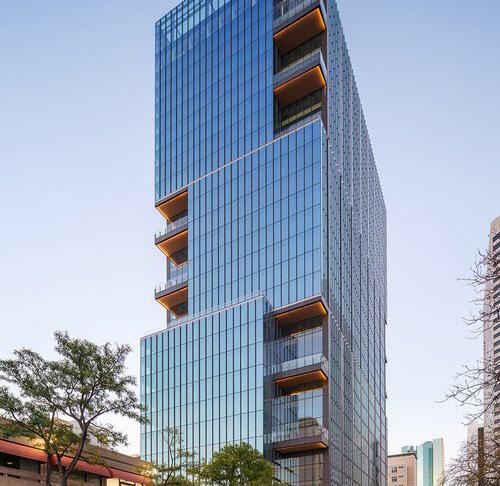
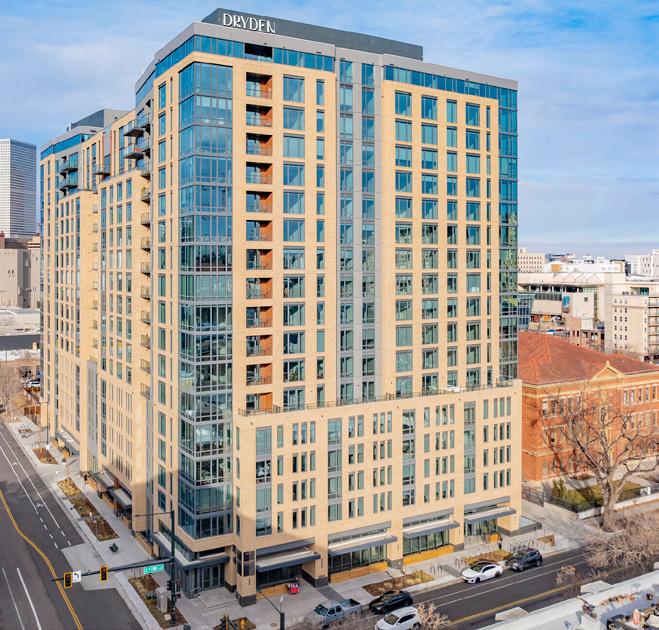
+ Evan West Renovation Units: 420 Investment: + $170M
$1.3B
Downtown Denver has led the nation in new apartments since 2020.
Source: CoStar
Passed in May 2024, Senate Bill 233 (SB233) aims to reduce property taxes and prevent future increases. This bill will reduce the commercial assessment rate from 29% to 25% by 2027. Residential rates will also decrease under this legislation.
In 2024, the City focused in reducing the amount of time it takes to complete permit reviews by 30%. As of December 2024, the City reduced the total permitting time for Single-Family and Duplex projects by 35.3%, and reduced the number of days to complete the building/ zoning intake process by 30%. In 2024, the City also simplified permitting groundfloor commercial spaces along 16th Street.
Downtowns have historically played an integral part in regional “third places” where communities, employees and visitors can come together to celebrate and find a sense of place downtown. There are many opportunities to take advantage of to help reimagine downtown for future generations.
The Downtown Denver Partnership is encouraging the creation of a mixeduse district through a combination of policy work, planning initiatives, project advocacy and support of the DDDA. Additional tools for reimagining downtown include adaptive reuse, connecting and supporting the public realm, and prioritization of everyday amenities to attract and support a diversity of residents’ ages, incomes and backgrounds.
Parts of downtown lacking mixed-use development can create a gap in ground-floor activation and amenity deficiency, making it difficult to support a complete neighborhood. Focusing on bridging these gaps can create an attractive environment that spurs continued development through ease of living and enables a downtown that is activated 24/7.
2024 to 2029 Projected Annual Growth Rate by Geography
Downtown Denver continues to outpace the metro region, with much of the
Top 3 Tapestry Segments
Metro Renters (3B)
Laptops and Lattes (3A)
Social Security Set (9F)
Metro Renters (3B)
Young and Restless (11B)
Laptops and Lattes (3A)
Metro Renters (3B)
Emerald City (8B)
Young and Restless (11B)
“Downtown’s population grew rapidly over the past decade. Downtown Denver had the fifth highest population growth between 2020 and 2022 out of 26 major downtowns analyzed in a 2023 national study entitled Downtowns Rebound undertaken by the Philadelphia Center City District. This activity could be indicative of market demand and foot traffic to sustain more resident-serving retail, services, and amenities.”
- Progressive Urban Management Associates (P.U.M.A.) Downtown Denver Groundfloor Activation Strategy – Phase I
Source: ESRI 2024
Amidst persistent issues of affordability and lack of diversity in housing types, downtown residential growth is supported by recent surges in housing delivery and flattening rental prices.
Demand for housing remains strong, however, especially in expensive markets like Denver, a diverse residential base and housing options are a key part of downtown viability. The Partnership is advancing strategies to address affordability, particularly at workforce levels, through the Downtown Area Plan, changes in State and local policy to unlock development and mobility improvements that bring down overall cost of living challenges.
AMI is the standard used to calculate income limits for housing programs, subsidies, and initiatives. The US Department of Housing and Urban Development (HUD) calculates AMI annually for each county or metro area in the United States.
21% of downtown households are owners, compared to 49% citywide.
41% of citywide households cannot afford a 1-bedroom or larger apartment downtown.
The unit mix downtown is skewed towards smaller units. The City and County of Denver contains 29% Studio and 1 bedroom units vs 65% Studio and 1 bedroom in downtown.
Downtown and the surrounding regions have seen a large decrease in rent in 2024. This decline is due to an oversupply of apartments, which has outpaced demand. The pandemic caused a surge in demand for apartments in the Denver area, but the supply has since caught up. High occupancy rates and positive absorption highlight sustained demand in an attractive downtown market.
Source: CoStar
Downtowns across the nation, including Downtown Denver, are experiencing high vacancy rates, low leasing activity, and a concerning decrease in the value of commercial properties. As of January 2025, the national office vacancy rate in the United States was 19.8%. Downtown Denver is +7% higher than the national average, and the continued success of downtown is integral to activate vacant office spaces. Denver’s vacancy rate is higher than Austin (26.0%), Seattle (24.6%), Calgary (22.2%) and Minneapolis (19.4%).*
Overarching concerns in the downtown office market include 16th Street construction and declines in foot traffic, which create both perceived challenges, access to onsite parking, and safe and reliable transit. While none of these barriers are particularly surprising, it does provide an opportunity for growth and a shift in perception in each of the above areas. Hybrid work, in some form, is here to stay and the office workers we are seeing downtown have altered some of their values when it comes to attendance throughout the work week. Office workers value amenities and flexible work arrangements, primarily to improve work-life balance, avoid unpleasant aspects of office work, and eliminate commuting. Building supportive workplace infrastructure that fosters and caters to these needs is necessary for downtown’s success.
The average lease term increased from 4.8 years in 2023 to 7.0 years in 2024 *Source:
Leased

Austin, TX: 24.9% remote workforce
Raleigh, NC: 24.5% remote workforce
Denver, CO: 22.3% remote workforce
Source: U.S. Census Bureau, CoworkingMag
Over the past decade, employment growth in Downtown Denver averaged 2.2%, increasing from an employment base of more than 124,500 in 2014 to nearly 154,500 in 2024. Following a sharp pandemic-induced decline in employment in 2020, Downtown Denver rebounded quickly with two years of robust growth and employment exceeding pre-pandemic levels by 2022. Employment growth slowed to 0.9% in 2023 and showed a slight decline of 0.4% in 2024. The modest contraction in employment in 2024 was driven by a decrease in employment in the Leisure and Hospitality, Financial Activities and Wholesale & Retail Trade sectors. These declines were somewhat offset by gains in the Professional & Business Services and Information sectors.
Downtown’s largest employment sector, professional and business services comprise 33% of all downtown employment. The sector experienced an increase in employment of 3.7% in 2024, or a net gain of 1,809 employees.
Government remains the second largest sector in downtown (26%), and reported a slight decline in employment, contracting 0.1% between 2023 and 2024.
Hospitality posted the largest contraction in absolute employment in 2024, falling by 923 jobs, or 4.9%. This drop in employment follows strong hiring in 2023 when employment expanded by 7.7%.
Financial fell 3.9%, or by 596 employees in 2024, as the city’s financial institutions continue to feel the effects of tight monetary policy.
The information sector saw the second largest percentage increase in employment in 2024, with a gain of 7.4%, or 671 employees, bucking the trend of Metro Denver where employment in the sector fell 6.0% over the period.
Natural
Expansions 2024
Invenergy
HOK
Amazon
Michael Best
Monday.com
Redaptive
Ibotta
Garnett Powell Maximon
Barlow & Farbes
Accelo
bet365
Frost Brown Todd
Klaviyo
Relocations 2024
Whole Foods
Booyah Advertising
Snell & Wilmer
MBH Architects
Caribou
SonderMind
Cushing Terrell
Blackpoint Cyber

“The Mile High City and its thriving business community is the ideal location to launch the next chapter in our company’s future, and we’re excited to create an industry-leading, innovative workplace in our new home.”
- bet365 Spokesperson

“Denver’s vibrant business community and thriving economy provide incredible growth opportunities. Our larger studio space enhances our ability to collaborate with clients, deliver innovative designs and shape Denver’s future. We look forward to strengthening our partnerships and creating new ones as we expand in the region.”
- Candace Todd, NCIDQ, Senior Regional Practice Leader
“We are thrilled to expand into a larger space featuring collaborative work areas. This space will allow us to cultivate a workplace where employees feel inspired by the local Denver community and deeply connected to monday. com’s broader mission and goals. I have no doubt that this combination of local pride and global perspective will help us build even stronger teams, drive new opportunities, and contribute to the ongoing growth of Denver.”
- Shiran Nawi, Chief People and Legal Officer


“We’ve come a long way since our humble beginnings in the basement of a LoDo firehouse, and we look forward to continuing to be a part of revitalizing downtown Denver and playing our part in the continued growth of this city that has given us so much.”
- Bryan Leach, Ibotta’s CEO and Founder

At the Partnership, we know that establishing downtown as an economic hub that consistently competes with the nation’s top-ranking cities starts with retaining and recruiting companies and people. With a strong education partner and anchor like Auraria Higher Education Campus, our center city needs to support a diverse, high-quality workforce at all levels, ensuring that they want to stay and grow here.
Source: Esri (2024), SB Friedman
Tracking Denver’s Inclusive Growth: Rankings among 54 Large Metro Areas with at Least 1M Residents
7th in Growth
3rd in change in jobs at young firms (+55%)
11th in Prosperity
10th in change in standard of living (+25%) and average annual wage (+20%)
27th in Inclusion
20th in change in employment rate (+6%)
29th in Racial Inclusion
6th in change in white/people of color relative property rate gap (-5%)
13th in Geographic Inclusion
8th in change in top/bottom neighborhoods median household income gap (+$4,833)
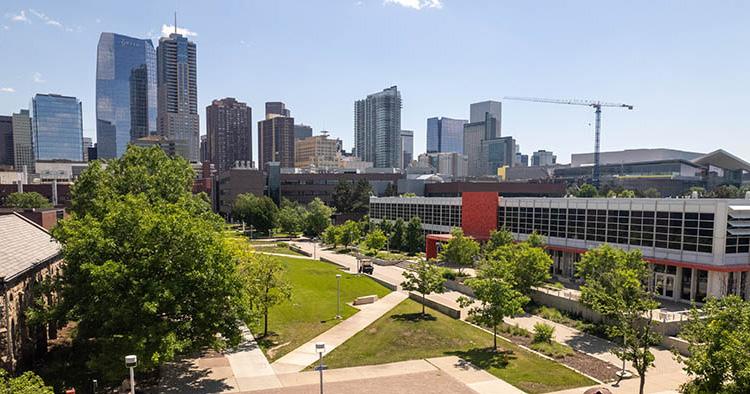
40.5K Auraria Students Fall 2023
The availability of a strong labor force has kept Denver a competitive city across multiple industries. Colorado is one of the top states for educational advancement across the country. Downtown Denver is home to the Auraria Higher Education Campus in our urban core, boasting two 4-year colleges and one 2-year college, with nearly 25,000 full-time equivalent enrolled students and over 9,000 degrees awarded over the past academic year.
Source: MetroDenverEDC, NCES, IPEDS Data



CBRE’s Annual ‘Scoring Tech Talent’ Report ranked Denver 8th for tech talent in the U.S. in 2024, up two spots from 2023. Denver reported the 11th highest concentration of employment in tech industries for Large Tech Talent Markets. Over the past five years, Tech employment in Denver grew 12.6%, with strong growth among the sector’s Computer & Information Systems Managers and Software Developers & Programmers occupations.
Wa shington, D.C.
SF Bay Area
8th in Tech Talent in North America
“Leading the way as the best state for women entrepreneurs is Colorado. Not only does this state have a 76.9% startup survival rate, it also has one of the highest percentages of new businesses nationally. That means more entrepreneurs are setting up shop in the Centennial State than any other—and most of them stand the test of time. Colorado also has the highest percentage of women-owned businesses in the entire country at 10.4% so any female entrepreneur that launches a business here will be in good company.”
- North One Business Banking
Source: CBRE Scoring Tech Talent 2024, U.S.Census Bureau (Metro), Environics Analytics (April 2024) *Population age 25+ with a bachelor’s degree or higher
Denver ranked 13th in the Fall 2024 JLL Research Talent Hubs Rankings which studies trends for the 1.64 million graduates entering office-centric roles in 2024. Denver scored high as both a Talent Magnet and a Talent Engine, signifying that the region both attracts and produces high-quality university graduates.
As the integration of tech and data talent evolve, so does the workspace, shifting to meet the needs of a sustainability conscious, interdisciplinary and growing workforce. Venture capital funding in Denver-Boulder’s life sciences sector rose 28.4% from 2023 to 2024, marking one of its strongest years yet.
Source: Savills Denver-Boulder Q4 2024 Life Sciences Market Report
Best Place to Find a Job
Source: WalletHub 2024 Q1
11th
Best Cities for Young Professionals
Source: Niche
Best States to Start a Business
Source: WalletHub 2024 Q1
Regional Transportation District (RTD) ridership continued to grow in 2024, reflecting a slight increase over 2023. The return to office trends, coupled with higher service frequencies, helped drive this growth. However, concerns over safety and large-scale infrastructure maintenance projects resulted in service disruptions, which ultimately impacted ridership performance.
To enhance affordability, RTD reduced fares and made the Zero Fare for Youth initiative permanent, providing free public transit to customers aged 19 and younger. Additionally, several policy initiatives passed in 2024 will help sustain current revenue levels and secure new funding for RTD.
Source: Regional Transportation District Safety &

RTD has expanded its Transit Police Department from 19 officers in 2023 to 87 in 2024, with a 24/7 patrolling model launched in May 2024.
Shared
Total Trips Made Downtown by Hour & Weekday in 2024
Micromobility refers to commercially operated bikes and scooters that are available for rent. Also referred to as bikeor scooter-share.
Mobility trends in Downtown Denver continued to evolve throughout 2024. While concerns about parking—particularly in terms of availability and cost—remain prominent, there is a noticeable gap between public perception and the actual availability of parking. Although tens of thousands of parking spaces are available downtown, many people find it challenging to identify where these spaces are located. Additionally, the varying number of days employers require in-office attendance further influences the volume of commuters traveling downtown.
According to the 2024 Downtown Denver Travel Survey, the percentage of solo driving trips increased in 2024 compared to 2023. Conversely, the use of bikes and e-bikes also rose, with over one-third of cyclists relying on e-bikes for their daily commute. Furthermore, more than half of e-bike riders reported receiving a voucher from Denver’s Office of Climate Action, Sustainability and Resilience or the Colorado Energy Office to assist with the purchase of their e-bike.
Total trips ending in downtown: 2.2M trips
Median trips per day for trips ending in downtown: 6K trips (high of 15.6k on June 15th)
Median distance for trips ending in downtown: 1.1 miles
Median duration for trips ending in downtown: 10.4 min
Public Outreach feedback 91% of respondents believe that trees are public infrastructure and should be given equal consideration.
Source: Denver released its Urban Forest Strategic Plan in 2024.
4%
Downtown Denver’s Current Tree Canopy 127 Tree Beds Enlarged Through UFI Since 2020
The Downtown Denver BID manages hundreds of planters throughout downtown. Our commitment to testing the viability of perennial plantings is not only a commitment to building a sustainable downtown, but also one to our downtown community to use resources wisely. Perennial plantings reduce the overall water usage by one third compared to annual plants. As of 2024, ~10% of the Downtown Denver BID managed planter fleet is planted with perennials. In addition, 125 new planters were brought online on the newly renovated 16th Street. All of which feature of a perennialforward planting scheme.

“Prosperity and sustainability coexist in Denver because we know that we must choose both for future generations to thrive in our city.”
- Denver Mayor Johnston

The Urban Forest Initiative (UFI) is a collaborative effort between the Downtown Denver BID, the Downtown Denver Partnership, the City, and property owners to grow downtown’s tree canopy through tree bed. The UFI partners with downtown property owners to complete tree bed enlargement projects. The program shares the project cost with the property owner and manages the design, construction and permitting processes. The program installed 20 enlarged tree beds in 2024, bringing the overall program total to 127.
Source: DDBID
5280 Trail Opportunity to Create an Essential Connector for Downtown


Nearly 25% of the 5280 Trail footprint is in a phase of
- Acoma 10th > 12th | Fully funded design and construction
- Sunken Gardens Speer crossing | Alternatives analysis
- Sunken Gardens | 5280 Trail alignment confirmed in Parks Master Plan process
- La Alma Lincoln Park | 5280 Trail alignment confirmed in Parks Master Plan process
- Wynkoop Speer Crossing | Proposed pedestrian bridge in Ball Arena redevelopment
- 21st Street Coors Field > Benedict Fountain Park | Conceptual design complete
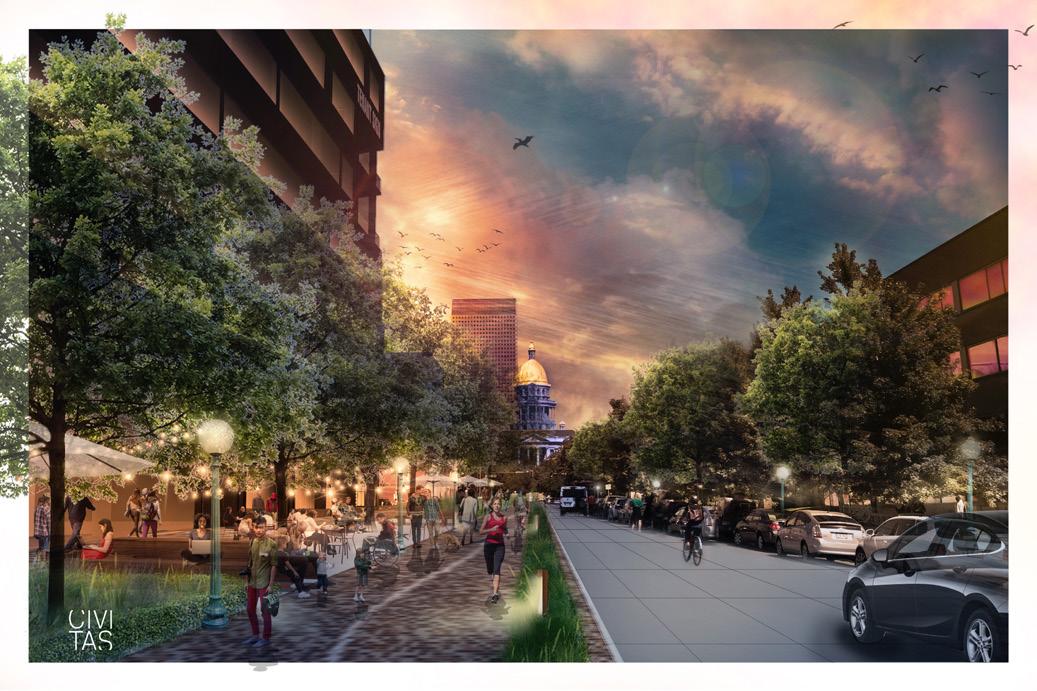
“The 5280 Trail is a bold, visionary project to transform how public right-ofway is used in Downtown Denver. The 5280 Trail will link neighborhoods and connect people by re-imagining streets to better balance needs of all people, regardless of how they choose to get around Downtown Denver.”
- 5280 Trail, DDP
Scheduled for Completion in Fall of

1M
20+
Source: DDBID, City of Denver OCF

In 2024, six new ground-floor businesses opened on 16th Street, along with two new sidewalk kiosks. One of the foundational building blocks of a thriving downtown is groundfloor activation, as it is crucial to facilitating all economic activity.
“As Downtown continues to reinvent itself, particularly over the next several years, consider this an opportunity to truly make Downtown a relevant destination for a broader crosssection of Denverites and regional residents. For example, work to recruit and curate retail and experiences that are culturally diverse, relevant, affordable, and welcoming.”
- Progressive Urban Management Associates (P.U.M.A.)
Downtown Denver Groundfloor Activation Strategy – Phase I
16th Street Small Business Support Program 2024
Denver Economic Development & Opportunity (DEDO) Business Support Expands Off of 16th to 15th and 17th Streets
60 Businesses Received Grants
Funds for Retention Support Provided
45 Spaces Available for New Businesses
Available spaces will be activated by a combination of lease-paying tenants, interactive art installations, local entrepreneur collectives, and more.
20% of these spaces are 5,000 square feet or bigger. Large spaces are unfeasible in today’s market. Demising and other grants are now available to enhance their leasability.

Street Retail Mix
Source: City of Denver, DDP WhyDowntown Denver
Retail sales tax collections in Downtown Denver picked up in 2024, following two years of rapid growth in 2021 and 2022 and a pronounced slowdown in 2023. After falling 47% in 2020, retail activity increased 57% in 2021 and 26% in 2022, with slower growth of 0.7% in 2023. In 2024, retail activity strengthened, increasing 4.7%. Restaurants continue to provide the greatest amount of retail sales tax revenue, making up nearly 40% of all retail sales activity in 2024, as patrons and workers steadily return to the city. Between 2023 and 2024, Downtown Denver retail sales growth (+4.7%) outperformed Center City (+2.0%) and the City and County of Denver (+1.5%).
Source: City & County of Denver, Office of the Controller
Source: DDP WhyDowntown Denver

Source: City & County of Denver, Office of the Controller
The vision for 16th Street retail is one that celebrates all things local, providing low barrier-to-entry opportunities for retail entrepreneurs at all stages of their business development.
In 2024, there were nine active kiosk permits on 16th Street and in The Outer Space, at 16th and Welton.

Education Partnerships: CU Denver
Product Development
Market Events
Still testing proof of concept. Opportunity to gain skills in all areas of business development.
Vendor
Concept is deemed viable. Opportunity to gain experience with merchandising, staffing, inventory management.
Retail Collective
Has skills to operate and merchandise a space. Opportunity to gain skills with landlord relations and cost management.
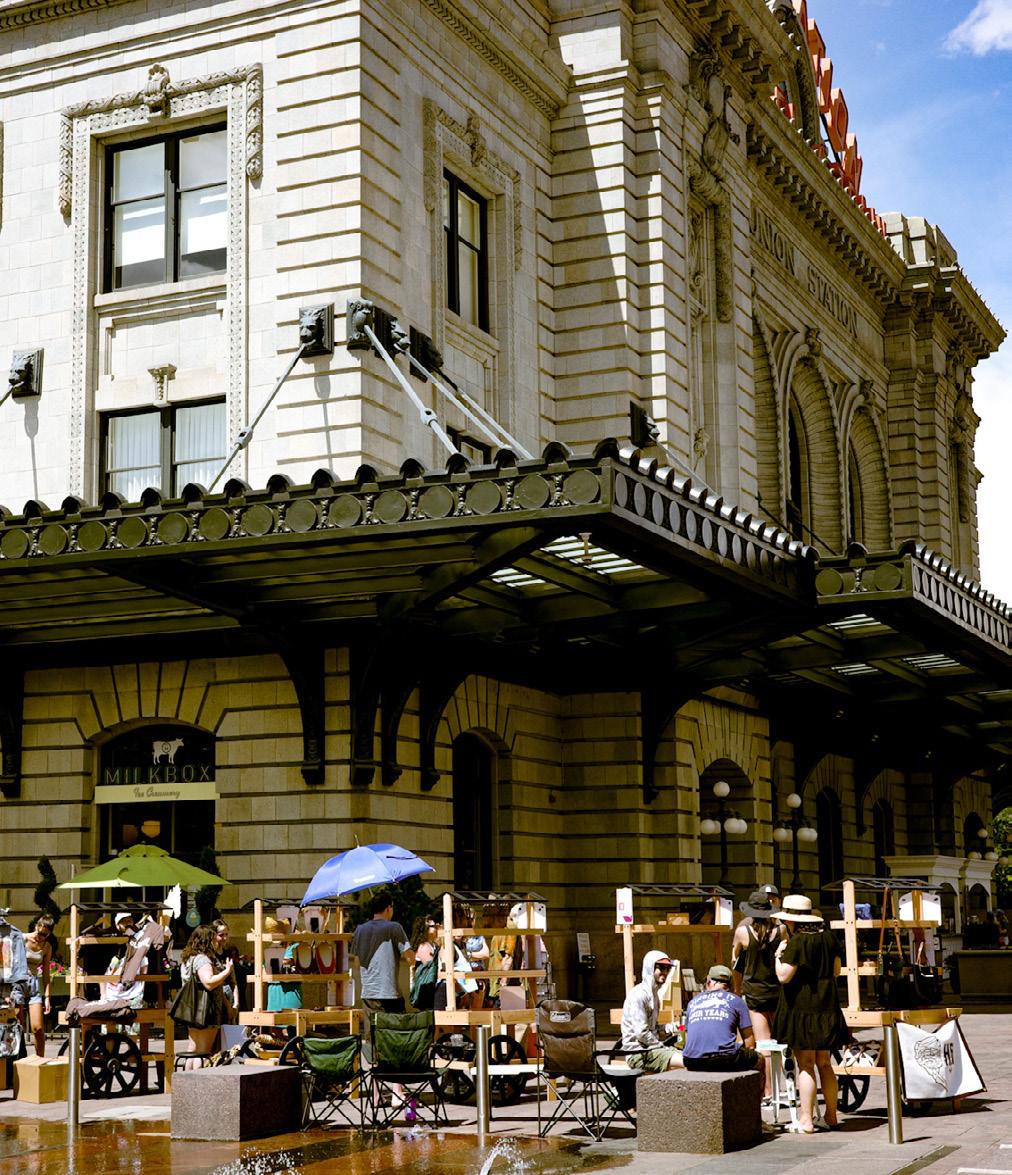
Source: DDP
Micro retail Kiosks
Has skills to maintain a lease and manage costs. Opportunity to limit risk by operating in affordably small space.
The 2023-24 cohort of the ColoradoBuildingWorkshop designed, fabricated, and installed four kiosks on 16th Street in 2024.
Supported Leasing Incentives
Has skills to own and operate a successful retail business. Opportunity to test out a downtown location and build visibility.
Market Rate
Experienced Retailer
Successfully operates in multiple markets. Opportunity to create a flagship Colorado or U.S. location.
The Partnership’s retail activation program is designed to support entrepreneurs at different stages of their business journey.
In 2024, the program supported 19 vendors with free access to 14 public outdoor markets, at which they generated between $25 to $727 per four- to six- hour sale window.

The Downtown Denver Partnership in partnership with Denver Economic Development & Opportunity (DEDO) launched a website to make it easier for businesses and real estate brokers to find available downtown spaces and data to aid their decision-making.

Over 73M people visited downtown in 2024. An increase of 1.8M total users over 2023.

Civic Center Park’s Holiday programming brought nearly 400K visitors to events such as the Mile High Tree and the Denver Christkindlmarket.
The 2024 Parade of Lights brought over 200,000 people to Downtown Denver during the time of the parade. 20% more visitor activity than 2023.


2024 Opening Day was at 93% of the 2019 visit activity. Bringing more than 118,000 visitors to the Ball Park District. Downtown saw 327,000 total visits on opening day.


2024 Outside Fest Brought a total of 12,500 visitors over the course of 2 days. 20% from 250+ miles away!
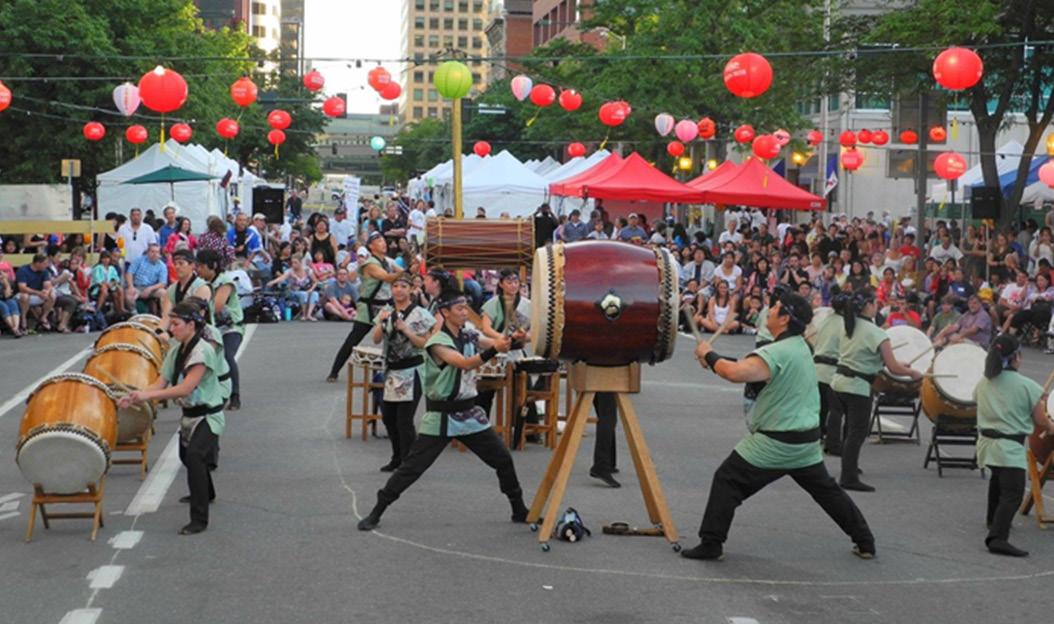







Sports, Culture and a Vibrant Urban Energy Draw a Wide Audience Downtown
Events and activations downtown help build a better base for visitor traffic and increase Denver’s regional significance for tourism, events, and celebrations. Denver has experienced consistent visitor growth, exceeding pre-pandemic totals. Denver’s reputation as an “outdoor city” filled with culture like the newly recognized Lavender District, diverse dining options, thriving sports teams like the Colorado Avalanche and Denver Nuggets, and family-friendly activities, combined with the allure of the nearby Rocky Mountains, make the city a yearround destination for visitors from across the country and around the world.
20M
Overnight Visitors to Denver
Source: VISITDENVER 2023
$8.8B Spent by Overnight Visitors
Source: VISITDENVER 2023
Star Restaurants in Denver, Including Four Downtown
In October 2024, Empower Field at Mile High was ranked No. 3 for Best NFL Stadium and No. 5 for Best NFL Stadium Food by USA Today.
7th
Most Popular City to Visit
Denver continues to be a strong advocate for women’s sports, gaining national recognition in 2024 by being awarded the National Women’s Soccer League’s 16th Team, welcoming the Denver Onyx as the city’s first professional Women’s Elite Rugby Team and setting the new American Professional Women’s Hockey attendance record for game in the U.S. with 14K fans packed into Ball Arena.




In 2024, Denver International Airport (DEN) served over 82.3 million passengers, a year-over-year (YoY) increase of 5.8% versus 2023. The year was ranked as the busiest year in DEN’s history and marked the first year to surpass 80 million annual passengers for an airport that was built for 50 million passengers.
“This will be the largest overall investment in a women’s professional sports team in history. We have a once-in-a-generation opportunity to leverage this massive private investment to revitalize and transform Santa Fe Yards into a new hub of thriving community activity, a place for outdoor recreation, restaurants, retail, and for building connections with our community.”
- Rob Cohen, Denver NWSL Controlling Owner
3rd busiest airport in the U.S. and 6th busiest in the world
June 2024 was the busiest month in DEN history, with more than 7.6 million passengers
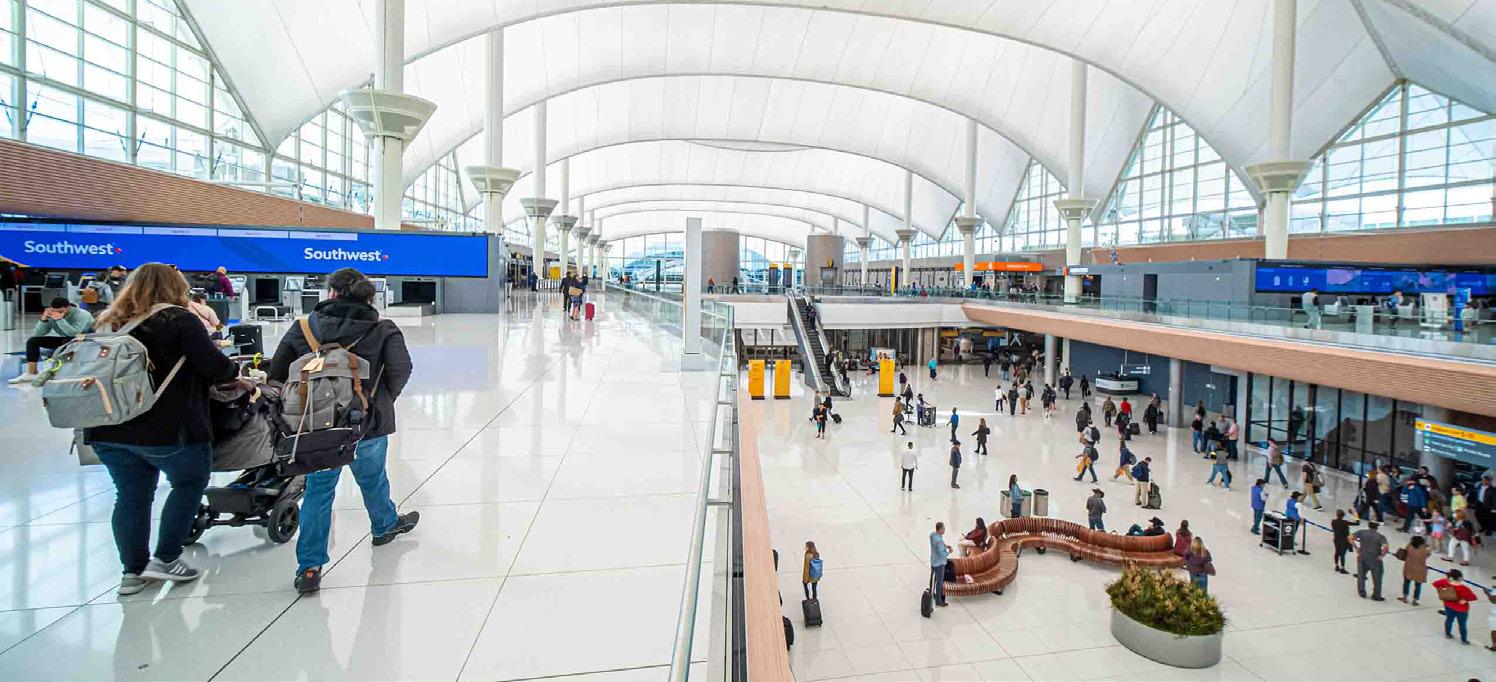
DEN has 190 domestic destinations with non-stop flights and 33 international destinations with non-stop flights
As the world’s largest aircraft, Lufthansa’s A380 is now operating at DEN and offers 509 seats, representing a capacity increase of nearly 75% over the previously-scheduled
More than half of the city’s lodging tax (55%) is generated in hotels downtown. The completion of three major projects support continuing growth in the hotel and convention markets. In Q1 2025, a $65M renovation of the Hyatt Regency Colorado Convention Center kicked off, enhancing the venue’s capacity and modern amenities to attract larger events and conventions, further boosting local tourism and the regional economy.
Downtown Denver Hotel Market Trends
2019
2020
2021
2022
2023 67% $141 $209
2024 69% $145 $207
Source: CoStar
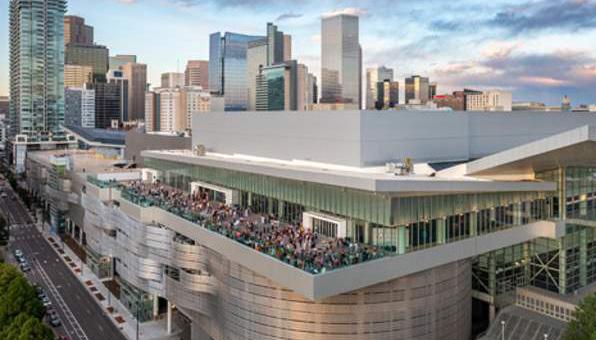
Center Expansion

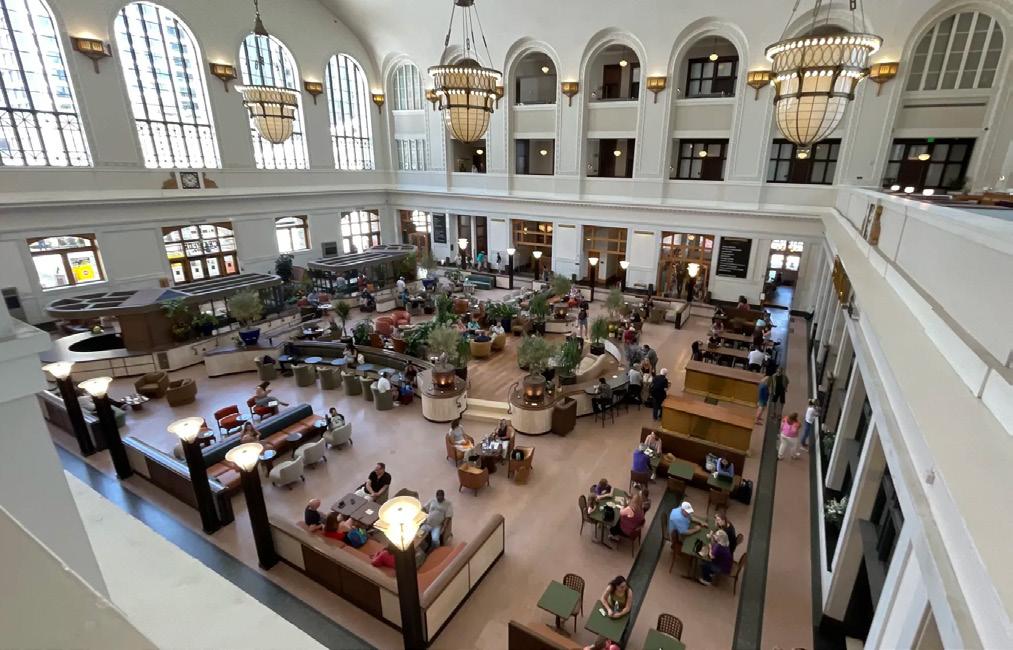
The new Bluebird Ballroom hosted 24 groups worth more than $285 million in economic impact in 2024. In addition to convention activity, the arts play a strong role in downtown Denver's economy. The 2024-25 season brought six Broadway shows to the Buell Theatre at the Denver Center for the Performing Arts (DCPA), including Hamilton!
“Leisure travel, which has been the primary driver of demand in the post-Covid era, will moderate while group, corporate and international travel return to pre-Covid levels.”
- JLL Global Real Estate Perspective November 2024
Source: Colorado Convention Center
2024 marked a year of monumental moves for the downtown. The Partnership successfully worked with our partners at the City to renew and expand the Downtown Denver Development Authority, a game-changing approach to urban development that unlocks over $570 million of investment. This entity gives us unprecedented tools to drive strategic investments, foster public-private partnerships, and accelerate transformative projects. The new Downtown Area Plan was also launched in Fall of 2024 in partnership with the City and will bring a new comprehensive blueprint for our future.
Downtown Denver Development Authority
opened in March 2025
Large Scale Projects & Master Plans


Barriers & Movement
Downtown Area Plan
Working collaboratively with our partners, including the City and County of Denver and State of Colorado, the Downtown Denver Partnership advocates on behalf of business for policies that support our work to build one of the most dynamic downtowns in the nation. We advocate for a business-friendly policy and regulatory environment that supports growth necessary to fuel our city’s tax base, nonprofits and economy. In 2024, the Partnership weighed in on more than 40 individual issues that spanned topics including housing, transportation, development processes, technology and safety.
We stand for minimizing regulatory and cost burdens whenever possible, ensuring the choice to stay here and continue to contribute to our economy is an easy one.
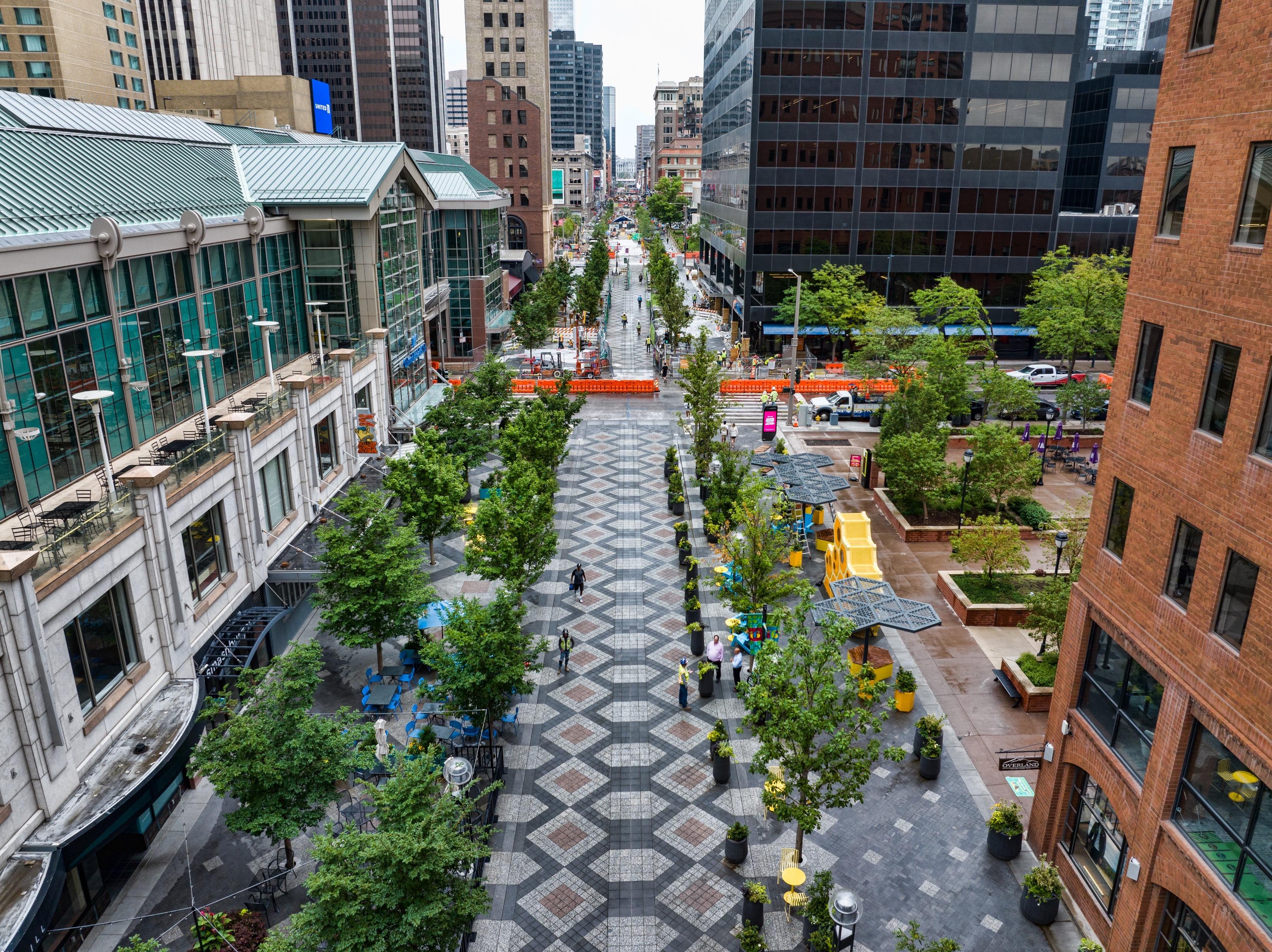
Impactful Projects and Investments Shaping Our City 2000’s - Union Station
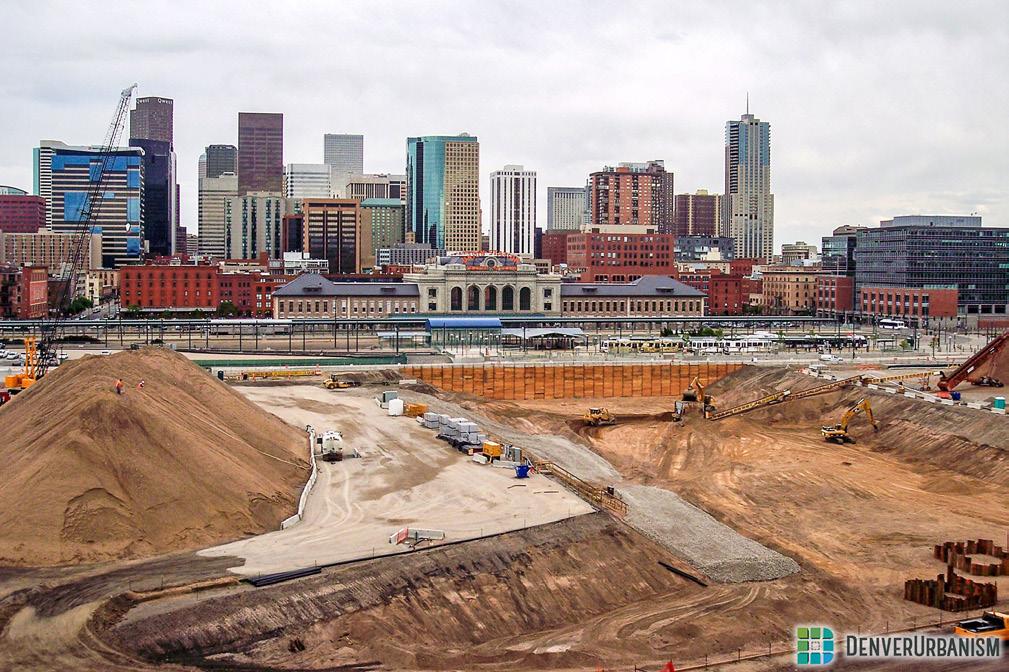
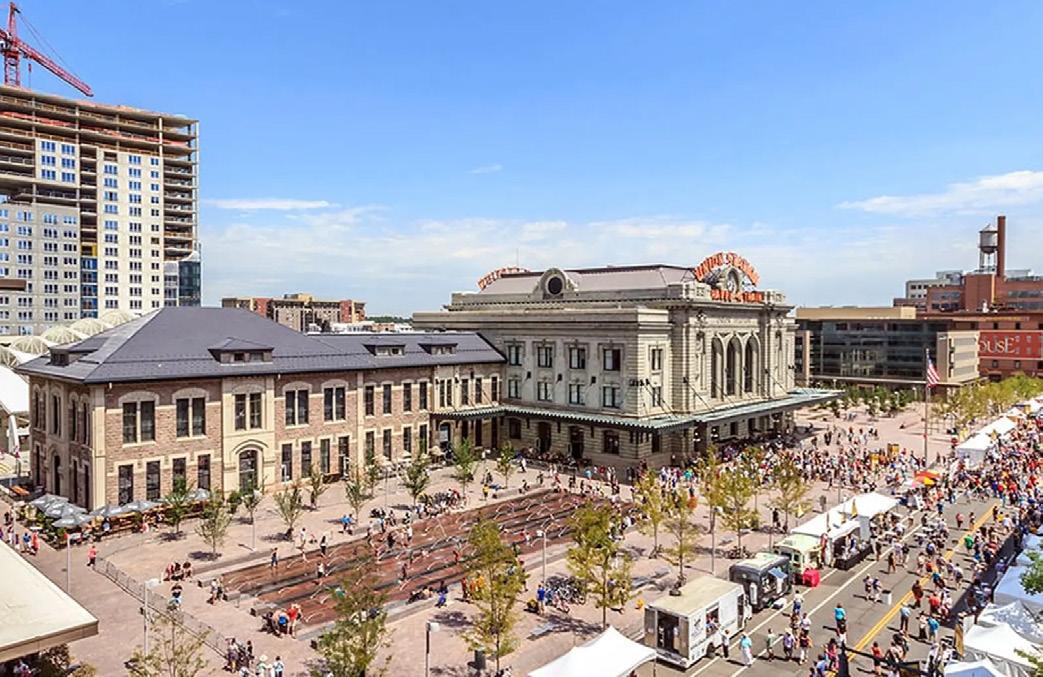
Injection of DDDA funds creates the opportunity of public funds spurring private investment.

- The Knight Foundation




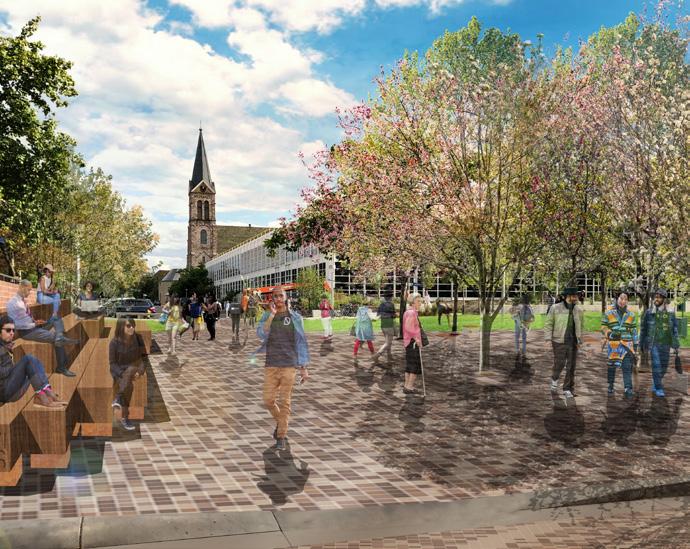




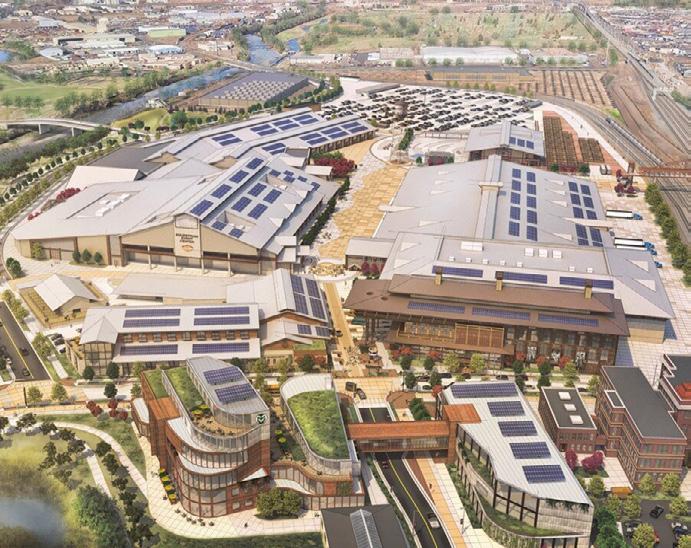
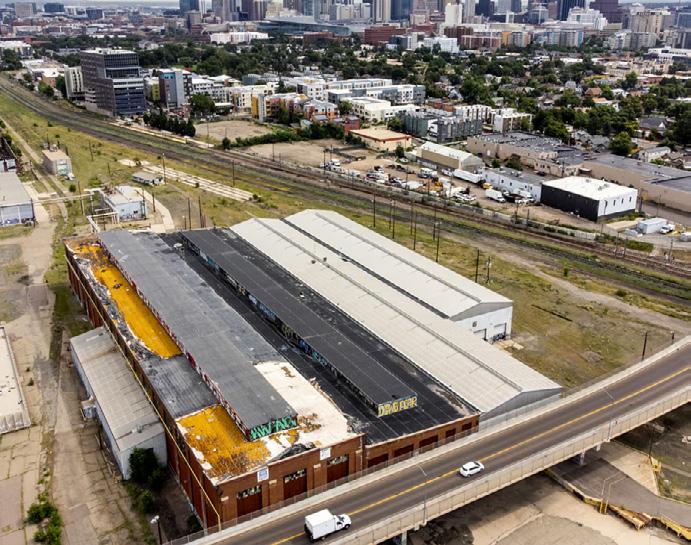

Dorit Fischer, Chair, NAI Shames Makovsky
Amy Hansen, Vice Chair, Polsinelli
Elizabeth Salomon, Treasurer, Highland Square Advisors
Albus Brooks, Secretary, Milender White
David Sternberg, Brookfield Properties
Pat McHenry, City Street Investors
Kim Kucera, CRL Associates
Traci Lounsbury, Elements
Amy Cara, East West Partners
Nicole Ament, Brownstein Hyatt Farber Schreck
Wendy McCray-Benoit, Pricewaterhouse Cooper
Brianna Borin, Snooze
Albus Brooks, Milender White
Amy Cara, East West Partners
Lori Davis, Grant Thornton
Rhys Duggan, Revesco Properties
Jon Gambrill, Gensler
Fred Glick, Columbia Partners
Dorit Fischer, NAI Shames Makovsky
Rich Harris, Harris Family Law
Greg Leonard, Hyatt Regency Denver Convention Center
Gloria Schoch, VF Corporation
Tom Kiler, Spark & Halo
Traci Lounsbury, Elements
David Sternberg, Brookfield Properties
Kevin Kelley, Greenberg Traurig, LLP
Kim Koy, Employers Council
Katie Kramer, Boettcher Foundation
Kim Kucera, CRL Associates
Peter Lauener, Brookfield Properties Development
Scott Martinez, MG Public Affairs
Pat McHenry, City Street Investors
Paul Washington, IMA Corporation
Mizraim Cordero, United
Ivan Anaya, Columbia Ventures
Timothy Aragon, Denver Broncos
Jon Buerge, Urban Villages
Kyle Chism, Topo Strategies
Ryan Beiser, PNC
Janine Davidson, Metro State University of Denver
Marc Dispense, D.A. Davidson & Compay
Kayla Garcia, Girls Inc.
Kris Gaw, Denver Health
Andy Feinstein, EXDO Development
Amy Hansen, Polsinelli
David Haltom, Patrinely
Eric Hiraga, Matrix Design Group
Jennifer Hodges, Liberty Global
Polly Jessen, Kaplan Kirsch
Caroline Kackley, Wells Fargo
Nathan Lohmeyer, DaVita
Dustin Liljehorn, JE Dunn
Paul Washington, IMA Corporation
Hollie Velasquez-Horvath, Xcel
Kevin Kelley, Greenberg Traurig, LLP
Lori Davis, Grant Thornton
Nathan Lohmeyer, DaVita
Rhys Duggan, Revesco Properties
Jon Buerge, Urban Villages
Raju Patel, Bank of America
Nathan Roberts, Kittrege Ventures
Jodi L. Janda, Jones Lang LaSalle
Ed Blair, Sage Hospitality Group
Wendi Malone, Hines
Evan Gart, Gart Properties
Julian Tucker, Thompson Hotel
David Foley, Brookfield Properties
Ron Fano, Spencer Farms
Dana Mack, Kimley Horn
Rachel Marion, MB Strategies LLC
Kevin McCabe, Newmark
Lexi Muller, Southwest Airlines
Dianne Myles, Human Focused Media
Walker Monfort, Colorado Rockies
Brittany Morris Saunders, Colorado Technology Association
Leslie Oliver, Comcast
Chris Payne, Riverside
Roger Pecsok, Continuum
Kendee Ruark, JP Morgan Chase
Alan Salazar, Denver Water
Elizabeth Salomon, Highland Square Advisors
Ryan Schmidt, PCL Construction
Chris Shears, Shears Adkins Rockmore Architects
Mark Sidell, Gart Properties
Janice Sinden, Denver Center for the Performing Arts
Maren Stewart, Taloma Partners
Brandon Wilcox, KPMG
Colin Wheeler, VF Corporation
Hollie Velasquez-Horvath, Xcel
Bill Vitek, Dig Studio
Elizabeth Whillock, Ovintiv
Luke Davidson, Land Title Guarantee
Jessica Ostermick, CBRE
Enrico Meyer, 9News
Mike Neary, Kroenke Sports Entertainment
Mahes Prasad, US Bank
Martha McGee, Nine Dot Arts
Kathleen Fogler, Tryba Architects
Karen McNeil Miller, Colorado Health Foundation
Binh Diep, Slalom
Adeeb Khan, City and County of Denver
Colleen Walker, AHEC
Debra Johnson, RTD
Raymond Gonzales, Metro Denver EDC
Marielena DeSanctis, Community College of Denver
Malik Robinson, Cleo Parker Robinson Dance
Richard Scharf, VISITDENVER
Rodney Milton, Urban Land Institute
Raju Patel, Bank of America
Barbara Grandjean, Husch Blackwell

